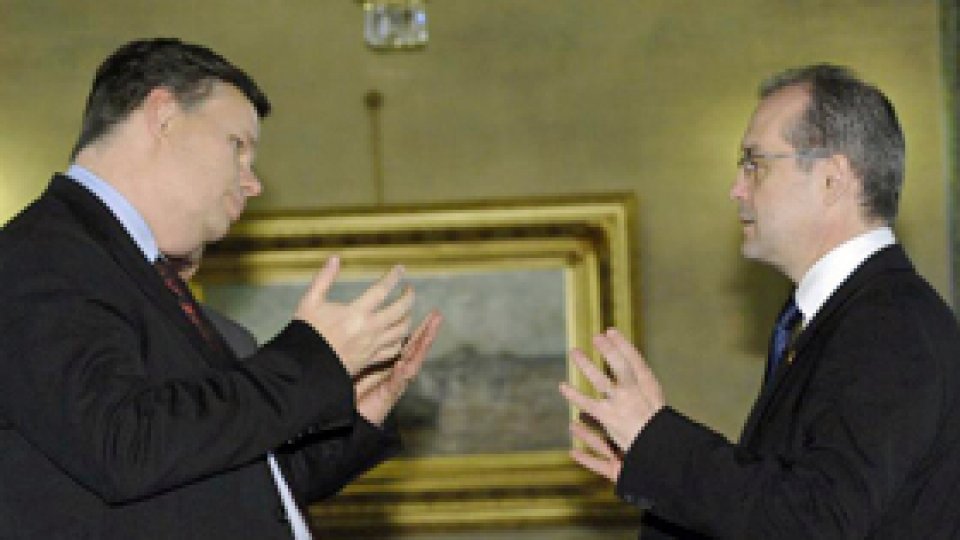Economic growth leads to higher salaries and pensions
Prime Minister Emil Boc stated that pensions and salaries would increase only if financial stability was achieved. IMF claims that an increase in pensions and salaries would require a higher GDP growth rate.

Articol de Diana Domenico, 31 Ianuarie 2012, 11:57
The government is willing to consider a slight increase in pensions and salaries, but only if financial stability is achieved.
Prime Minister Emil Boc wanted to clarify this problem before the government meeting that took place on Monday and mentioned that the authorities would not rush to adopt popular measures, which could affect the stability of the country.
The IMF representatives argue that the increase in pensions and salaries would require a higher GDP growth rate.
IMF mission chief to Romania Jeffrey Frank (left) and Prime Minister Emil Boc. Photograph: Agerpres.
According to IMF mission chief to Romania Jeffrey Frank, Romania posted a remarkable GDP growth last year, which, however, is not reflected in people’s standard of living.
The IMF official underlined that more policies would have to be adopted to stimulate economic growth.
‘Economic growth is back, there have been four consecutive quarters of economic growth. The bad news is that the increase is not big enough to improve Romanians’ living standard. A further increase is necessary’, Jeffrey Franks said.
‘1.8 percent GDP growth is good enough to increase pensions and salaries’
An increase of 1.8 percent in the GDP is good enough to increase in salaries and pensions, according to Minister of Labour Sulfina Barbu.
However, a final decision will be taken in April, when the ministry will publish a reposrt on the GDP growth in the first months of this year.
‘If the country’s economy does not grow by at least 1.8 percent, salaries and pensions will not increase, especially since Romania will not request a loan to cover such increases’, Sulfina Barbu added.
‘If economic growth is confirmed, then we might discuss about slightly increasing pensions and wages. If we have a minimum growth of 1.8 percent, like we posted last year, we can discuss about no more than 5 percent’, the Minister of Labour stated.
Trade unions and Opposition are reluctant
The trade union representatives claim that the promise of wage raise is part of an electoral strategy.
According to the leader of BNS, Dumitru Costin, resources are extremely limited, considering that there are still too many management positions in the government and there no improvements have been made in the public activity.
‘Half a year ago wages were cut because desperate measures had to be taken, the financial resources were not enough to pay wages.’
Creating new jobs is one of the solutions proposed by unions along with using the European funds to attract young people into the labour market.
The President of the Social Democratic Party (PSD), Victor Ponta, also hopes that the possible raise of salaries and pensions is not an electoral shenanigan.
‘I hope that the government, who is currently negotiating with our international partners, takes things seriously and responsibly and allocate money which at this moment is being wasted to cover such a raise’, Victor Ponta said.
Translated by Cătălina Virvescu
MA Student, MTTLC, Bucharest University














